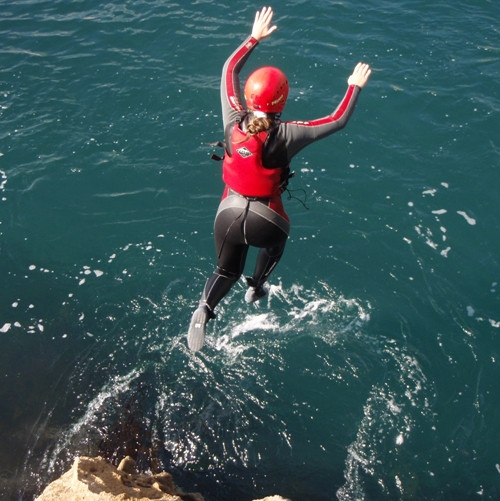Coasteering

Coasteering is an exciting outdoor adventure activity which combines rock climbing, swimming, jumping and scrambling. The rocky, challenging terrain of Dorset’s coast will make your coasteering adventure a memorable and enjoyable experience.
You should only go coasteering with qualified and experienced guides. Dorset offers a variety of coasteering activities to suit various ages and experiences. Find out which provider and coasteering activity is best suited to your requirements. Check out the providers on the iCoast map and read more on their web sites.
Safety:
- In an emergency call 999 and ask for the Coastguard.
- Only go coasteering with qualified and experienced guides to ensure your safety and enjoyment.
What do I need?
The coasteering providers will generally provide you with all the required equipment, however, most require that you bring your own swimsuit to wear under a wetsuit and suitable footwear, such as trainers, you don’t mind getting wet.
When is the best time to do it?
Coasteering can be done at any time of year however, poor weather conditions can affect your experience and availability of the activity. Check the weather tool on iCoast for weather predictions.
Planning your trip
What to look out for?
Watch out for wildlife
Please follow these steps to make sure that you do not disturb wildlife while you are coasteering on the Dorset coast:
-
Think about whether you are going to be going through or landing at any areas that are important for wildlife.
-
The Dorset coast has some Special Protection Areas for birds on the Dorset coast. In these areas you need to have an awareness of bird breeding and "over wintering" seasons because birds are particularly sensitive to disturbance between:
- November and March when birds are "over wintering" and need to conserve energy reserves.
- Mid April to the end of June when birds are breeding. If birds are disturbed during this time then birds can abandon eggs or chicks.
-
The Dorset coast has some Special Protection Areas for birds on the Dorset coast. In these areas you need to have an awareness of bird breeding and "over wintering" seasons because birds are particularly sensitive to disturbance between:
- Don't linger for too long when you are close to wildlife - its great to look, but then move on
- Avoid damaging any coastal plants or intertidal species and habitats
- Report live strandings of cetaceans, and injured/entangled marine mammals to British Divers Marine Life Rescue (BDMLR) on 01825 765546 (24 hours). Report all other live injured or entangled animals to RSPCA 08705 555999
Watch out for other users
- Look out for other recreational users and share the coast and water- Swimmers, jet skiers, divers, windsurfers etc. all use the water too so you should be observant, careful and respectful when you are out coasteering.
- Tankers, ferries, military ships, fishing boats and cruising boats all use the Dorset coast too. Most of these vessels carry out their activities further offshore than you will be planning to coasteer, however it is important to remember that these vessels have slower stopping distances, can travel at faster speeds than you and all can produce large bow waves which could be dangerous.
Beach and Marine Litter
- Take home all your rubbish - do not discard rubbish at sea or on the beaches. Marine and beach litter spoils peoples experience of the Dorset coast, can harm wildlife as well as disrupting commercial productions such as litter getting tangled up in fishermen's nets. Find out more about Marine litter in Dorset.




